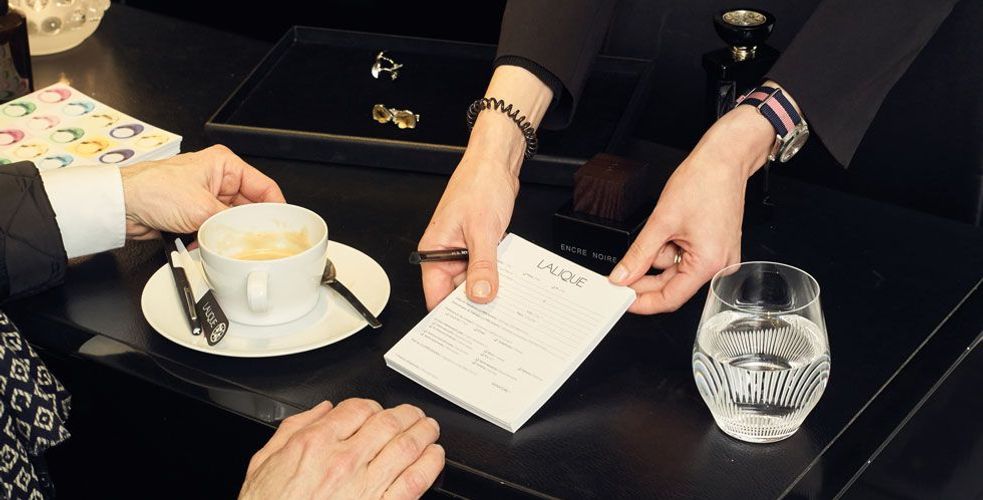51% of luxury retail employees are considering leaving their jobs

For a long time, being called LVMH, Chanel or Tag Heuer protected HRDs and talent scouts from the hunt for talent and its Sales. But no more! All retailers and brand managers need to review and rethink their EVP (employer value proposition).
At the Peninsula last week, there was a big crowd and some big names. LVMH, Diptyque, Sézane, Chanel, L'Oréal... For the writer of this summary, who is more used to conferences on CRM and call-centres, we were surprised by the audience, which was much more female than the audience at tech meetings, and by the quality of the presentation and recommendations. The attention was lively and wide-ranging, a sign that the subject was a good one and was being dealt with. It wasn't a video of a famous Youtuber climbing Everest, or a Victoria Beckham or Kate Moss capsule collection, but a study, refined by CXG. The content was well worth the effort. And yet it sounds an alarm bell for the world of retail and employee experience.
The changing role of customer advisors in the luxury sector is a significant one, as revealed in Paris by CXG, a leading international company specialising in customer experience for luxury brands. The report looks at the challenges facing luxury retail in terms of talent acquisition, development and retention.
Transforming luxury retail - Key findings
Focusing on the development of recruitment, onboarding, training and retention strategies, the full report ‘The Advisor Effect: Driving Retail Success by Re-imagining The Role of The Sales Advisor’ draws on information gathered from 12,000 surveys of retail employees at 12 luxury brands between 2022 and 2024, as well as 27 in-depth interviews with senior professionals from a range of luxury sectors, including fashion, jewellery and beauty, in Europe, the US and China.

The main findings of the report?
A talent retention crisis exists: a significant proportion (51%) of those surveyed said they intended to leave their position, highlighting a major talent retention problem in the industry. This is a significant increase on the 30% recorded 2 years earlier. ‘Our research shows that the luxury retail sector is at a critical juncture,’ said Christophe Caïs, founder and CEO of CXG. ‘The rise of digital tools and omnichannel strategies has transformed the traditional luxury retail model, requiring sales advisors to combine quality personal service with a mastery of digital tools’.
Changing roles: the responsibilities of luxury sales advisers have expanded considerably. They now have to manage digital interactions and relationships, while mastering story-telling and CRM skills. This evolution requires a mix of emotional intelligence, adaptability and technical skills to enhance the customer experience.
The impact of interactions with advisors: in the luxury sector, 78% of customers say that a single negative interaction with an advisor can lead to a purchase being abandoned. Conversely, advisers offering an exceptional experience can increase purchase intent fivefold, to 86% compared with just 17% for others.
Work-life balance: it is alarming to note that only 39% of employees claim to have a satisfactory work-life balance. Younger generations are increasingly looking for clear career paths, skills development opportunities, flexible working hours and meaningful work that goes beyond traditional remuneration.
Strategic recruitment initiatives: luxury brands now need to recruit talent from a variety of sectors while leveraging social networks and artificial intelligence for recruitment. The aim of this change is to broaden the talent pool from which brands can recruit.
Preparing for the future of luxury retail
The event at which the study was presented highlighted the findings of a detailed report which will be available in November. This report will explain how to rethink the role of sales advisors in luxury retail. It will present strategies to help retail professionals adapt to these multi-functional roles. In addition, it will highlight the importance of creating meaningful work environments that allow sales advisors to flourish while balancing their engagement and professional development, as well as flexible work-life integration.
‘The results of the study highlight the urgent need for luxury brands to invest in the employee experience, refine their Employer Value Proposition (EVP) strategies and implement approaches that revalue the role of sales consultants. Brands that prioritise talent development and align themselves with the evolution of employee values will be able to maintain a competitive edge and offer exceptional luxury experiences in the future,’ concluded Christophe Caïs.

In Paris, at the Beaupassage, Cyril Brulé, head of a modelling agency, shared the same observations and convictions with us five years ago. There is not a single company that can now dismiss the need to reinvent itself, or to go back to basics, on these issues.
The next issue of Cahiers de l'Expérience Client, Number 10, will devote a survey to everything that is being done in certain SMEs to attract and retain talent.
About CXG
CXG is a leading consultancy and solutions company founded by French entrepreneur Christophe Caïs, specialising in innovative strategies to improve the customer experience and drive performance for premium and luxury brands. With expertise gained from working with over 220 iconic brands, CXG supports clients throughout their CX journey, providing insights and driving meaningful change. CXG's four core practices - Customer Experience Measurement, Customer Insights, Consulting & Transformation and Academy - provide a comprehensive framework for complete CX transformations.
Founded in 2006 in China, CXG has grown into an international company with 12 offices in 85 countries and a team of over 260 employees. Thanks to its constantly evolving network of customer experience experts, CXG helps brands to improve their experiences.
Manuel Jacquinet



